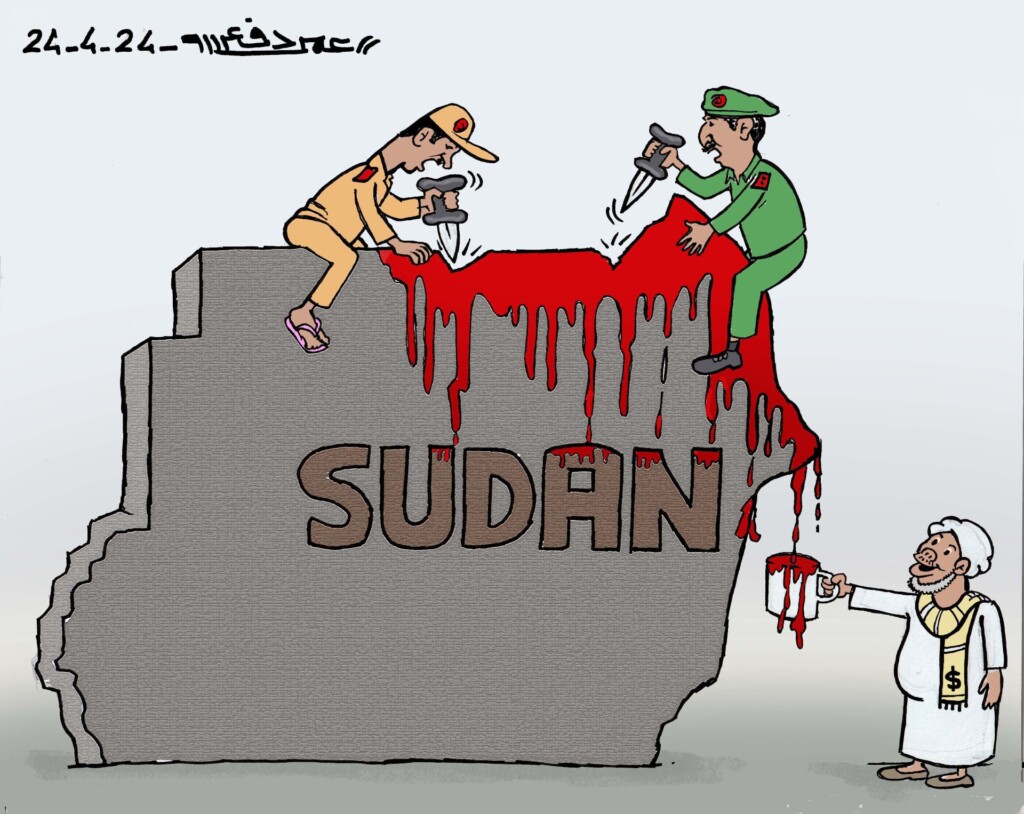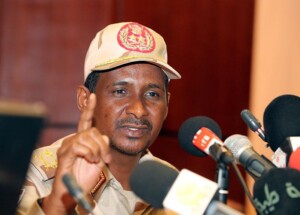Sudanese de facto govt working on ‘new constitutional framework’

Cartoon by Omar Dafallah, April 24 (RD)
According to Lt Gen Yasir El Atta, deputy commander of the Sudanese Armed Forces (SAF), the de facto government in Port Sudan, capital of Red Sea state, is working on a new constitutional framework, after which a new government will be announced. The Rapid Support Forces (RSF) denied rumours that it seeks to declare an independent state in western Sudan after seizing control of the North Darfur capital of El Fasher.
In an interview with the Arabic Al Hadath* TV satellite channel on Saturday, Gen El Atta, who became member of the Sudanese Sovereignty Council following the October 2021 coup d’état, said that “in Port Sudan, they are working hard, and very fast”, on a new constitutional document, that is to replace the one developed by the Forces for Freedom and Change (FFC) and signed with the army in August 2019.
A prime minister will be appointed who will form a government of technocrats that will prepare for the transitional period “toward democracy” after the war has ended, he said.
These plans, however, are entirely unconstitutional, lawyer Sati El Haj commented. He told Radio Dabanga yesterday that the powers of the president of the Sovereign Council, SAF Commander Lt Gen Abdelfattah El Burhan, are limited.
“A fully fledged Sovereignty Council, let alone its president, cannot repeal the Constitutional Document. It cannot suspend any of the provisions of the Constitutional Document or any of its articles,” El Haj said.
“The statements made by El Atta, who derives his position from the very same document, contradicts it’s provisions and wants to destroy it because it does not grant the SAF leadership more powers in any way, either individually or collectively.”
‘Sudan is currently not governed by the constitution and the law, but by moods of certain persons and haphazard policies’ – Lawyer Sati El Haj
The lawyer noted that the SAF-RSF coup d’état on October 25, 2021, “was a military coup in the literal sense of the word. It was a coup against the constitution, which was torn and expired since October 25. Sudan is currently not governed by the constitution and the law, but by moods of certain persons and haphazard policies.”
Security apparatus
On May 8, El Burhan issued a “constitutional decree” that approved the amended National Security Act governing the work of the General Intelligence Service (GIS).
The amended law broadened the powers of the GIS, which according to lawyers are contrary to its mission stipulated in the 2019 Constitutional Document.
The predecessor of the General Intelligence Service (GIS), the National Intelligence and Security Service (NISS), was one of the most infamous and feared organs of the Omar Al Bashir regime, that acted ruthlessly against any political dissent. The NISS was officially disbanded in July 2019 following the ousting of President Al Bashir three months earlier. Several articles of the National Security Act of 2010 were amended, to restructure the intelligence service and adjust its competences. The GIS was officially no longer authorised to detain people or carry out search operations.
However, after the 2021 coup d’etat, reports of violent suppression of freedoms that characterised the 30-year Al Bashir regime returned in all levels of society. Military Intelligence and GIS were given free powers of detention again – which has been now grounded again in the recently amended security act.
‘New country’
As North Darfur’s capital El Fasher is witnessing fierce battles between the SAF and the Rapid Support Forces (RSF), the paramilitaries are denying rumours that the RSF seeks to declare an independent state in western Sudan in case it seizes control of the city. El Fasher is the last of the five Darfur capitals that is not controlled by the RSF.
‘Our forces prioritise the protection of civilians’ – RSF spokesperson
RSF spokesperson El Fatih Gurashi said in a press statement yesterday that the paramilitary group is committed to the unity of Sudan and is working “to build a new country where justice and democracy prevail”.
Gurashi also denied accusations of targeting displaced people in El Fasher, blaming the rebel combatants fighting alongside the Sudanese Armed Forces (SAF) for the deteriorating security situation in the area. “They are hiding among civilians and using them as human shields.”
As for the RSF soldiers, he said that “the bravest of our forces prioritise the protection and security of civilians while continuing their struggle”.
The Justice and Equality Movement faction headed by Jibril Ibrahim (JEM-JI) and the Sudan Liberation Movement breakaway faction led by Minni Minawi (SLM-MM) renounced neutrality in November last year, to support the SAF in their war against the RSF. Rebel leaders who remained neutral were removed from their positions by the head of the Sovereignty Council and SAF Commander-in-chief Lt Gen Abdelfattah El Burhan.
* In early April, the Sudanese Ministry of Culture and Information yesterday announced the suspension of operations for Saudi state-owned broadcasters Al Arabiya and Al Hadath, as well as the UAE-owned Sky News Arabia channel. The ministry cited non-compliance with license renewal procedures and a lack of transparency as grounds for the decision. Drawing immediate criticism, the Sudanese Journalists Syndicate (SJS) denounced it as a blatant violation of freedom of expression and press freedom. Gen El Atta earlier unleashed harsh criticism against the United Arab Emirates (UAE) and other countries he accused of providing the RSF with weapons.











 and then
and then